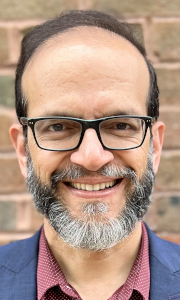 Taking nicotine out of a tobacco context and inspiring confidence in the role it can play in harm reduction is the goal of Sudhanshu Patwardhan, medical director at the Centre for Health Research and Education (CHRE), a private healthcare company in Hampshire, UK.
Taking nicotine out of a tobacco context and inspiring confidence in the role it can play in harm reduction is the goal of Sudhanshu Patwardhan, medical director at the Centre for Health Research and Education (CHRE), a private healthcare company in Hampshire, UK.
He will be taking this mission to next month’s Global Forum of Nicotine in Warsaw, where he wants to open up the conversation and “make the change happen”.
“Nicotine is tightly associated with tobacco and its harms and a lot of the policymakers around the world harbour a mix of nicotine misperceptions and industry suspicions. The nicotine illiteracy that’s prevalent there has to be addressed,” Patwardhan said. “We need to empower credible voices with scientific evidence in this important public health conversation.”
Patwardhan is concerned that certain healthcare professionals group smoking, tobacco and nicotine together, and therefore tar potentially safer e-cigarettes, heated tobacco products and nicotine pouches with the same brush.
“They think nicotine causes cancer and the coverage in the media feeds this view,” he said. “We want to bring clarity to the conversation, and have a discourse backed by objective evidence. It is difficult to have a tobacco cessation conversation with a health minister whose ears have been filled with nicotine-prohibitionist propaganda.”
Why don’t novel products reach poorer countries?
He points out that, despite the World Health Organization (WHO) including nicotine replacement therapy in its model essential medicines list, there’s a disconnect between calling something an essential medicine as a policy and it being understood by practising physicians.
Originally from India but now based in the UK, Patwardhan trained in medicine in his country of birth, where he witnessed the impact of tobacco use at first hand.
“In India there are nearly 300m people consuming tobacco in all sorts of risky product formats,” he said. “Rates of oral cancer are really high in countries such as India, Pakistan and Bangladesh compared with, say, Sweden, where people consume less risky smokeless tobacco products such as snus.”
Patwardhan wants to open up the conversation with the pharmaceutical and tobacco industries at GFN and beyond.
“Nearly 80% of tobacco users are in lower- and middle-income countries, where nicotine replacement products are not available, and I want to ask the corporations why they’re not launching products in those countries. I want to give those countries a voice. I want to inspire change.”
A healthy mix of people and perspectives
He insists that he’s not anti-corporate and believes multinational businesses have the power to be vehicles for positive change. He says his GFN session won’t be a “corporate bashing” but it won’t be paying lip service to the tobacco companies’ efforts either.
“At GFN, nicotine consumers who are ex-smokers share the space with tobacco executives. This should serve as a good reminder and focus all minds on the billion-plus current tobacco users who still need support and alternative products to help them quit their risky habit.”
He’s hoping the event will be attended by a healthy mix of people from around the world with different perspectives to set the tone for a solution-focused conversation.
Patwardhan is no stranger to the corporate world. His early career was in the pharmaceutical industry – first at Pfizer in California, followed by a senior science role at Eli Lilly’s research division in Singapore. He went on to work at Nicoventures, a British American Tobacco (BAT) subsidiary that was the first to obtain a medicines licence for an e-cigarette in the UK.
After leaving BAT, he co-founded CHRE to bridge the gap in tobacco harm reduction policy and practice globally. “It is a topic close to my heart,” he said.
His work for CHRE in the UK is focused on disadvantaged communities, including mental health patients who smoke.
“They have a life expectancy that is reduced by as much as 10-15 years due to their smoking,” he said. “We are working with healthcare professionals to prioritise and enable smoking cessation among these neglected tobacco-user sub-populations.”
The challenging case of India
But at GFN, the panel-based workshop Patwardhan will be hosting will focus on lower- and middle-income countries (LMICs), and he said: “The tobacco industry enjoys a significant advantage in LMICs due to the role they play in many of those economies, as well as the lack of adequate regulatory and enforcement capacity in those countries to implement the WHO’s Framework Convention on Tobacco Control [FCTC].”
His native India is a particularly challenging case because there are so many people involved. These include thousands of tobacco farmers, millions of users of risky forms of smoked and smokeless tobacco products, a billion-dollar cottage industry in the supply chain of smokeless tobacco, as well as the rolling of bidis, Indian hand-rolled smoked tobacco products. Then there’s the country’s largest cigarette manufacturer, which both the state and BAT have shares in.
“And the Indian public health community has a high level of misperception about nicotine. Indian clinicians might advise their patients to quit tobacco, but without offering any behavioural support or adequate nicotine replacement. That is a recipe for quitting failure and relapse.”
At the GFN, Patwardhan will draw from a range of key industry stakeholders to discuss issues like these. He hopes the discussion will explore how these realities impact the availability, accessibility, and affordability of alternative nicotine products in LMICs, what role the pharmaceutical and tobacco industries can play in making safer forms of nicotine available to users in these countries, and the degree to which the tobacco industry’s “transformation” is reaching these populations.
- Sudhanshu Patwardhan will be speaking at the Global Forum of Nicotine, to be held in the Warsaw Marriott Hotel in Poland from 21st to 24th June.
– Lorraine Mullaney TobaccoIntelligence staff







